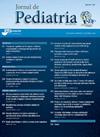Patients with genital ambiguity referred without a sex definition: the relationship between clinical picture and defined sex of rearing
IF 2.8
4区 医学
Q1 PEDIATRICS
引用次数: 0
Abstract
Objective
It was to verify the association between the definition of sex of rearing and, clinical and cytogenetic features among patients with genital ambiguity referred without a sex assignment.
Methods
The sample consisted of 133 patients with genital ambiguity seen at a single reference service. These patients did not have a defined social sex at the first consultation and their etiological diagnosis was obtained during follow-up.
Results
A total of 133 cases were included, 74 of which were reared as males and 59 as females. No correlation was found between the year of birth and the year of the first consultation with the definition of sex of rearing. However, the definition of sex of rearing was associated with age at the first consultation, severity of genital ambiguity, presence of palpable gonad(s), presence of uterus on ultrasound, karyotype, and diagnosis. Palpable gonad(s), more virilized genitalia, absence of a uterus on ultrasound, 46, XY karyotype, or a karyotype with sex chromosome abnormalities emerged as strong predictors for defining male sex. All 77 (58 %) patients over 18 years old had a gender identity in accordance with the sex of rearing; though 9 of 77 (12 %) had homo or bisexual orientation, especially girls with Congenital Adrenal Hyperplasia.
Conclusions
Clinical and cytogenetic data were strongly associated with the definition of the sex of rearing of children with genital ambiguity referred to a DSD center without sex assignment. Management in a specialized center allows the establishment of a gender identity in accordance with the sex of rearing.
未确定性别而转诊的生殖器模糊患者:临床表现与确定的抚养性别之间的关系。
目的在转诊的生殖器不明确患者中,验证养育性别的定义与临床和细胞遗传学特征之间的关联:样本包括在一家参考机构就诊的 133 名生殖器发育不全患者。这些患者在初诊时没有明确的社会性别,其病因诊断是在随访过程中获得的:结果:共纳入 133 例患者,其中 74 例为男性,59 例为女性。出生年份和初诊年份与饲养性别定义之间没有相关性。不过,饲养性别的定义与初诊年龄、生殖器模糊的严重程度、是否存在可触及的生殖腺、超声波检查是否存在子宫、核型和诊断结果有关。可触及性腺、生殖器更男性化、超声波检查无子宫、46 XY 染色体核型或有性染色体异常的核型是确定男性性别的重要预测因素。所有 77 名(58%)18 岁以上的患者的性别认同都与抚养性别一致;但 77 名患者中有 9 名(12%)具有同性恋或双性恋倾向,尤其是患有先天性肾上腺皮质增生症的女孩:临床和细胞遗传学数据与生殖器官发育不全中心转诊的生殖器官发育不全儿童的抚养性别定义密切相关。在专科中心接受治疗可以根据抚养性别确定性别身份。
本文章由计算机程序翻译,如有差异,请以英文原文为准。
求助全文
约1分钟内获得全文
求助全文
来源期刊

Jornal de pediatria
医学-小儿科
CiteScore
5.60
自引率
3.00%
发文量
93
审稿时长
43 days
期刊介绍:
Jornal de Pediatria is a bimonthly publication of the Brazilian Society of Pediatrics (Sociedade Brasileira de Pediatria, SBP). It has been published without interruption since 1934. Jornal de Pediatria publishes original articles and review articles covering various areas in the field of pediatrics. By publishing relevant scientific contributions, Jornal de Pediatria aims at improving the standards of pediatrics and of the healthcare provided for children and adolescents in general, as well to foster debate about health.
 求助内容:
求助内容: 应助结果提醒方式:
应助结果提醒方式:


